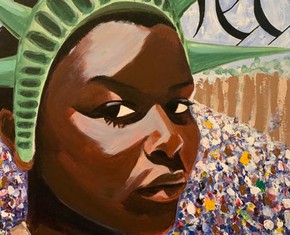The views expressed in our content reflect individual perspectives and do not represent the authoritative views of the Baha'i Faith.
During the last several decades, many scholars have noticed the marked decline of war and violence around the world and have written about it.
The decrease in violence and war deaths is one of the most positive indicators of the constructive process going on in the world. During the 19th century, for example, the French Revolutionary wars killed 70 out of every 100,000 people. In the 20th century, despite two World Wars and several genocides, the average number of war deaths went down to 60 out of every 100,000 worldwide. In the 21st century, the worldwide average of the number of deaths caused by war is down dramatically, to .3 per 100,000.
The work done by Steven Pinker, a professor of psychology at Harvard University, bears out this stunning trend. Pinker’s voluminous 2011 book, The Better Angels of Our Nature: Why Violence Has Declined, documents the diminishing impact of violence in our world, and the loss of legitimacy, not only of war, but all forms of violence in the collective international culture.
Despite the fact that civil wars still continue to rage in some parts of the world, Pinker reminds us that during the last 40 years many significant transformative events have happened in the direction of a more peaceful world. Just four decades ago, we lived in a world in which any of these changes appeared hopelessly impossible—yet all of them took place in relatively quick succession:
- The Soviet Union and the U.S. declared peace in the early 1990’s, officially ending the Cold War.
- China abandoned the extreme ways of the Cultural Revolution after the death of Mao, and began its peaceful rise under Deng Xiao Ping, becoming a major trading partner to the U.S. and the rest of the world within the short span of two decades.
- Apartheid, one of the most blatant forms of institutionalized racism, was dismantled in South Africa.
- Fascism and dictatorship began to wane as primary modes of government, giving way to liberal democracy in countries that had gone from one military coup to another for decades. There were fewer than 20 democracies in the world in 1976. Today, that number has increased to over 100.
- Most remarkably, Europe, which had given the world two of its bloodiest wars as recently as the first half of the 20th century, found its way to peaceful cooperation. The borders between these countries, which had seen so much bloodshed for centuries, are now marked by nothing more than a welcome sign.
- During the last few decades, similar transnational arrangements have developed in South America (UNASUR), South East Asia (ASEAN), and Africa (AU). Regional economic and political unions, which include plans for the elimination of formal border checks and adoption of common currencies, are on the rise across the globe.
- The world saw an end to the process of colonialization, with formal political independence of all former colonies by the 1970’s.
But to just speak about these trends with data is not enough. A scientific discussion needs both the data on the patterns and trends, and a logical, comprehensive explanation that would only be possible if we can pinpoint the cause of these transformative trends. In other words, once we have seen and understood this important data the question becomes: what caused these dramatic shifts and changes?
Baha’is believe all of this rapid movement toward a more peaceful and unified world has come about as a result of the energies released by Baha’u’llah’s new Faith:
His revelation of the Word embodies completely the teachings of all the Prophets, expressed in principles and precepts applicable to the needs and conditions of the modern world, amplified and adapted to present-day questions and critical human problems. That is to say, the words of Baha’u’llah are the essences of the words of the Prophets of the past. They are the very spirit of the age and the cause of the unity and illumination of the East and the West. The followers of His teachings are in conformity with the precepts and commands of all the former heavenly Messengers. Differences and dissensions, which destroy the foundations of the world of humanity and are contrary to the will and good pleasure of God, disappear completely in the light of the revelation of Baha’u’llah; difficult problems are solved, unity and love are established. For the good pleasure of God is the effulgence of love and the establishment of unity and fellowship in the human world, whereas discord, contention, warfare and strife are satanic outcomes and contrary to the will of the Merciful. – Abdu’l-Baha, The Promulgation of Universal Peace, p. 314.
This series of essays is adapted from Roya Akhavan’s new book, Peace for Our Planet: A New Approach, available here: http://smarturl.it/PFOPtg
You May Also Like
Comments

















Just to clarify. Stephen Pinker is the best story teller around. Like alot of people I enjoy reading his books. But he is not a scientist. He has been chastised for making this stuff up and for being used by the elite to the detriment of those who suffer injustice and has, to his credit, tried to mend his ways. His work has achieved tremendous popularity and everyone swears by it. But that does not make it true.
Undeclared war has killed millions recently. In the DRC alone 6 million in the grab for minerals. (See ...Payam Akhavan's last Massey Lecture.) Billions of people do not have enough to eat. Because of the old world order injustice towards poor people and people of colour is rampant.
Thank you very much Dr. Roya Akhavan.